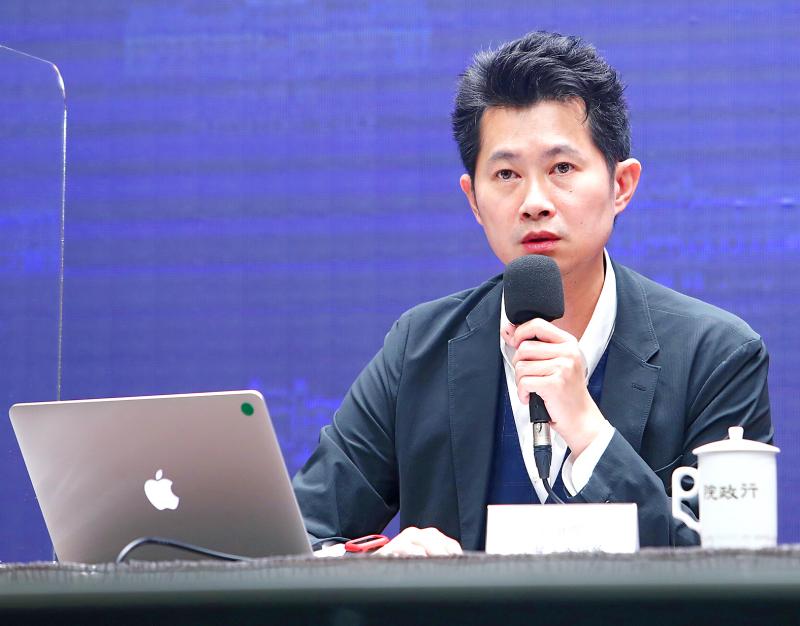Taiwanese are responsible for defending their own nation, Executive Yuan spokesman Ting Yi-ming (丁怡銘) said yesterday, after a US-based think tank published a survey that showed most Americans would be “prepared to take considerable risk” to defend US allies, including Taiwan, against military threats from China.
The Center for Strategic and International Studies survey asked members of the US public — as well as experts in national security, business, academia and human rights — about China-related issues.
Respondents were asked to rank how important it was to defend US allies in the Asia-Pacific region if they came under threat from China, on a scale from 1 to 10, with 1 representing “not worth taking any risk to protect them” and 10 “worth taking significant risk.”

Photo: CNA
The average score among the US public on the importance of defending Taiwan was 6.69, slightly lower than that for South Korea (6.92) and Japan (6.88), but higher than that for Australia (6.38).
The experts ranked the importance of defending Japan at 8.86, followed by Australia (8.71), South Korea (8.60) and Taiwan (7.93).
Taiwan would continue working to strive for international support, Ting said, adding that since President Tsai Ing-wen (蔡英文) took office in 2016, the government has been expressing its goodwill to China, while maintaining a rapport with other nations to safeguard regional peace and stability.
Taiwan’s global presence has greatly improved, as the world has seen the nation’s achievements in promoting democracy and gender equality, as well as containing COVID-19, he said.
Asked about the survey, the Ministry of Foreign Affairs yesterday reiterated the nation’s determination to boost its self-defense.
The government’s priority is to boost its self-defense capability, and that does not change based on surveys or public opinion in other countries, Department of North American Affairs Director-General Hsu You-tien (徐佑典) said.
During a videoconference on Wednesday to review the results of the survey, Bonnie Glaser, director of the center’s China Power Project, said that “support for Taiwan [in the US] is much more substantial than it was even one year ago.”
A survey last year by a Chicago think tank found that only 35 percent of Americans were in favor of US military action in support of Taiwan, Glaser said.
She attributed the change partly to growing concern in the US about China, as well as growing awareness of Taiwan, which had been prompted in part by Taiwan’s “exemplary performance in fighting the spread of COVID-19.”
The survey was conducted from July to August and received responses from 1,000 members of the public and 440 experts.
In related news, guided-missile destroyer the USS Barry sailed through the Taiwan Strait on Wednesday in what the US military described as a “routine” passage.
“The ship’s transit through the Taiwan Strait demonstrates the US commitment to a free and open Indo-Pacific [region],” a statement said. “The US Navy will continue to fly, sail and operate anywhere international law allows.”
China said that it had tracked the ship by sea and air.
“We warn the US to stop its words and deeds that provoke trouble and disturb the situation in the Taiwan Strait,” People’s Liberation Army Eastern Theater Command spokesman Colonel Zhang Chunhui (張春暉) said.
Additional reporting by AFP

The Central Election Commission has amended election and recall regulations to require elected office candidates to provide proof that they have no Chinese citizenship, a Cabinet report said. The commission on Oct. 29 last year revised the Measures for the Permission of Family-based Residence, Long-term Residence and Settlement of People from the Mainland Area in the Taiwan Area (大陸地區人民在台灣地區依親居留長期居留或定居許可辦法), the Executive Yuan said in a report it submitted to the legislature for review. The revision requires Chinese citizens applying for permanent residency to submit notarial documents showing that they have lost their Chinese household record and have renounced — or have never

A magnitude 5.6 earthquake struck off the coast of Yilan County at 12:37pm today, with clear shaking felt across much of northern Taiwan. There were no immediate reports of damage. The epicenter of the quake was 16.9km east-southeast of Yilan County Hall offshore at a depth of 66.8km, Central Weather Administration (CWA) data showed. The maximum intensity registered at a 4 in Yilan County’s Nanao Township (南澳) on Taiwan’s seven-tier scale. Other parts of Yilan, as well as certain areas of Hualien County, Taipei, New Taipei City, Taoyuan, Hsinchu County, Taichung and Miaoli County, recorded intensities of 3. Residents of Yilan County and Taipei received

Taiwan has secured another breakthrough in fruit exports, with jujubes, dragon fruit and lychees approved for shipment to the EU, the Ministry of Agriculture said yesterday. The Animal and Plant Health Inspection Agency on Thursday received formal notification of the approval from the EU, the ministry said, adding that the decision was expected to expand Taiwanese fruit producers’ access to high-end European markets. Taiwan exported 126 tonnes of lychees last year, valued at US$1.48 million, with Japan accounting for 102 tonnes. Other export destinations included New Zealand, Hong Kong, the US and Australia, ministry data showed. Jujube exports totaled 103 tonnes, valued at

BIG SPENDERS: Foreign investors bought the most Taiwan equities since 2005, signaling confidence that an AI boom would continue to benefit chipmakers Taiwan Semiconductor Manufacturing Co’s (TSMC, 台積電) market capitalization swelled to US$2 trillion for the first time following a 4.25 percent rally in its American depositary receipts (ADR) overnight, putting the world’s biggest contract chipmaker sixth on the list of the world’s biggest companies by market capitalization, just behind Amazon.com Inc. The site CompaniesMarketcap.com ranked TSMC ahead of Saudi Aramco and Meta Platforms Inc. The Taiwanese company’s ADRs on Tuesday surged to US$385.75 on the New York Stock Exchange, as strong demand for artificial intelligence (AI) applications led to chip supply constraints and boost revenue growth to record-breaking levels. Each TSMC ADR represents